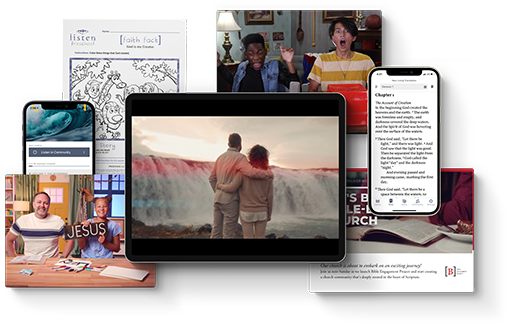Myth: You Can Believe Science or the Bible, but not Both
By Renée Griffith Grantham | Posted In Studying the Bible
Imagine that you have to assemble a bicycle, and you’re looking for the instructions. It’s your first time putting one together, so you’re going to be asking lots of specific questions about which parts connect to one another. While searching for the instructions, you stumble upon information about the bicycle you’re putting together. You find it fascinating, but the author is telling you about the reasons for the bicycle’s design, not its assembly. Do you throw away that piece of information just because it doesn’t answer your questions? Or do you appreciate what it has to say while recognizing that it doesn’t help you solve your current predicament?
Hopefully you wouldn’t throw the information out just because it didn’t answer your assembly questions. But people do that to the Bible all the time.
The world of science becomes more advanced with every passing year—no, even every week. Developments in the fields of botany, biology, chemistry, medicine, and more unfold at an astronomical rate. When we look at the Bible, we sometimes read things that appear not to make sense based on our knowledge of science today. For example:
- The Bible talks about the sun rising and setting, but we now know it is orbiting around the earth.
- The Bible talks about water above the sky, but we now know space is out there.
- The Bible talks about serpents eating dust, but we now know the nondirt, traditional diet of snakes.
The list could go on, but it comes back to the opening illustration: You went looking for a guide to explain how all the bicycle parts work together, but you found instead the work of an author explaining reasons for creating the bicycle.
We have to remember that the Bible was not written by modern authors (people like us) with modern goals or scientific understandings. It was written by ancient authors from their perspective and in their language.
To understand the opening of the Book of Genesis—and any Bible book, for that matter—it’s wise to back up and ask why that book was written.
The Book of Genesis explains the beginnings of many things including the history of the Israelite people. They’re a people that God started from one man with great faith: Abraham. Genesis concludes with Abraham’s descendants stuck in Egypt for what will turn out to be four hundred years. This was the reality for the author of Genesis and its first readers.
Imagine life with no Bible. This was the reality of God’s people from their beginning. Then God used Moses to start writing the history of His people, and in so doing answered some of the most important questions ever asked. Here’s where people get caught in the Bible-versus-science debate: God answered His people’s questions through Moses, the human author who communicated in the language and understanding of the day—which are very different from our own. And in Genesis, the Israelites’ questions that God answered had everything to do with the land they had just left: Egypt.
Egypt had one of the most powerful empires the world has ever known, lasting for more than thirty centuries. The empire had highly developed systems of writing, commerce, education, and religion, with numerous gods and goddesses. The Israelites, who lived in slavery to the Egyptian empire, could not escape from exposure to Egyptian religion. It surrounded them. We read in the Book of Exodus that God miraculously delivered His people from the Egyptians to the point that the Egyptians were giving them gifts as they left. This is because ten times, in ten different ways, God showed that He overpowered specific Egyptian deities (you can read this story in Exodus chapters 7 through12). By the time the Israelites left Egypt, they were finally gathered together in one place, away from Egypt, alone and free.
And they needed direction. So, God raised up His prophet Moses to start writing the history of His people and to give some new guidelines for living. God started off the first book, Genesis, by addressing the creation of the world to counter the Egyptian beliefs about the creation of the world that the Israelites grew up hearing. Those specific creation stories are the focus of another myth-busting article, but for now, let’s focus on the general premise of those myths: Many gods and goddesses were responsible for every part of creation. God began His book by saying, “In the beginning God created the heavens and the earth” (Genesis 1:1, NLT).
The human author, Moses, wasn’t trying to tell the Israelites all the details of how the world was created; he was establishing who created it. Understanding this is the first step to understanding that Genesis was not an instruction manual for how God assembled the earth. Genesis was developing an understanding of who created it. To the Israelites who were in slavery, God was basically saying, “Egyptian gods and goddesses didn’t create the earth, and they didn’t create you: I did.”
God was teaching His people through reminding them who they were: They were His, and He created everything they could see. The Israelite people weren’t looking for scientific answers from the Book of Genesis; they were looking for their identity. They were independent for the first time in nearly five hundred years, and they needed to trust the One who was going to lead them through the wilderness and into their Promised Land.
You probably have scientific questions about Genesis. But before you bring modern understandings to the biblical text, try putting yourself in the sandals of the ancient Israelites, and think of the questions they might have had about their identity as a newly freed people. Try to think about the human author, Moses, and how he passed on the message he was inspired to write. He used the language and history he knew. And ultimately, think of the One who inspired these words, God, and what He wants to communicate out of this text. The truth He’s delivering is timeless, and it’s worth digging through the cultural context of the author and first audience to find it.
Remember that the Bible was written for us, not by us. So yes, you can believe the Bible and still learn from science. They’re often answering completely different questions. Sometimes what seems like differences aren’t really differences at all.


